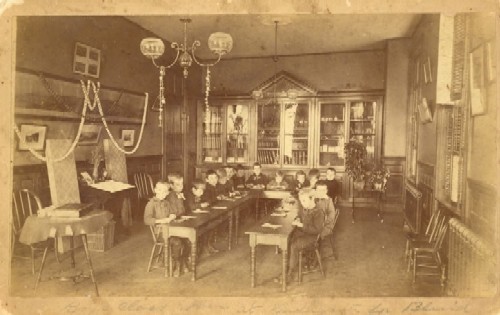A classroom at the Perkins School for the Blind, circa 1890. The image is of the boys' kindergarten class. The pupils sit around tables placed in a U shape and appear to be working on a project. They are wearing either Victorian blazers and neckties or sailor suits, and they all have on lace-up boots. The room contains bookcases, plants, and pictures and is decorated with paper chains. There is no blackboard or teacher's desk.
Anne found it hard to adapt to the Perkins School for the Blind. It was a quiet and polite place, unlike the rude environment of Tewksbury that she was used to. Tewksbury was noisy and raw. The working-class men and women, who were predominantly Irish Catholic, expressed all their emotions out loud and in public. Perkins on the other hand was quiet and sedate, reflective of its prosperous and Protestant patronage. Distasteful matters were not discussed at Perkins, whereas Tewksbury painted the world in very real, stark colors. Anne is quoted as follows in Nella Braddy Henney's book Anne Sullivan Macy:
The years at Tewksbury had opened mental windows and doors, pushed back concealing curtains, revealed dark depths in the lives of human beings which would have remained closed to a more happily circumstanced child. All my experiences had unfitted me for living a normal life. I learned quickly and thought myself superior to the other girls....
Sullivan was mortified when the other girls laughed at her for not being able to spell the simplest words. This made her determined to succeed. In time, she became a good reader and a lover of poetry as is again described in Nella Braddy Henney's book:
She [the teacher] had a regular class in Shakespeare, one hour a week, and that hour was Paradise to me. As I look back, it seems as if it contained all that was stimulating and fine in my school days. I used to leave the classroom in a trance. We read The Tempest, King Lear, Macbeth, As You Like It. The impression these plays made upon me was profound. I literally lived them. For the first time I felt the magic of great poetry, the beauty of words, the romance of life. Through all the vicissitudes of my life, through all the twists and turnings and the cross currents of my extraordinary experiences, poetry has been the noblest and most spiritualizing influence I have known.
A year after her arrival at Perkins, she was sent to the Massachusetts Eye and Ear Infirmary, where she had the first of two operations. The second operation took place a year later in 1882. These operations changed Sullivan's life. Her sight was greatly improved after ten years of almost no usable sight.
